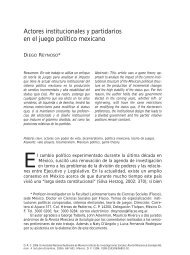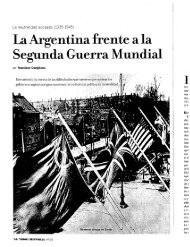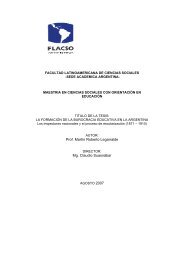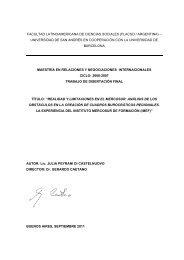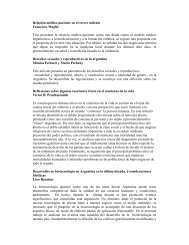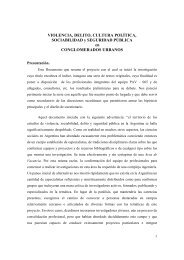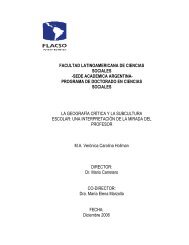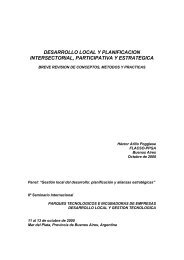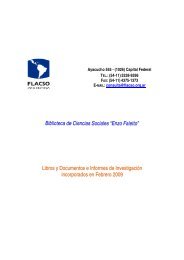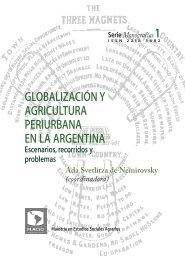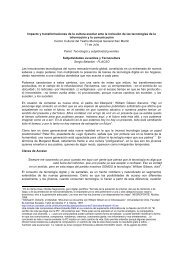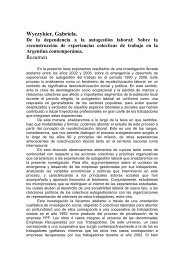Mercedes Botto Andrea Carla Bianculli - Flacso
Mercedes Botto Andrea Carla Bianculli - Flacso
Mercedes Botto Andrea Carla Bianculli - Flacso
You also want an ePaper? Increase the reach of your titles
YUMPU automatically turns print PDFs into web optimized ePapers that Google loves.
3.2.2. RESEARCH–POLICY ARTICULATION<br />
Most of the documents and studies we have just detailed were the result of either an appointment<br />
or a special request made by the governments to those academics involved in the in-house thinktanks.<br />
One could affirm that the articulation between policymakers and researchers was therefore<br />
guaranteed. However, this did not completely apply to the real situation. In the first place, only one<br />
of these different reports did get to the Argentina negotiators in due time and proper form. This<br />
was the report elaborated by the experts and academics of the Ministry of Economy and the UBA,<br />
respectively. Unlike the others, this study was the result of a teamwork, which certainly fulfilled the<br />
demands and requirements of the negotiators in due time. Moreover, negotiators were also actively<br />
involved in its elaboration. In turn, these meant that the working group could have access not only<br />
to information, but to the own instructions of the negotiating group as well.<br />
A second group of studies, which include the reports by Kume and Berlinksi, were also produced in<br />
proper form and in response to the demands and urgencies specified by the negotiators. In effect,<br />
both studies were intended to fulfil the same demand: the identification of the criteria to harmonize<br />
the nomenclators of the countries in order to attain a common denominator. In the case of Kume,<br />
the report arrived too late to the desk of the Argentine negotiators: “By the time Kume had finished this<br />
study, it was already too late; the decision-making process was already over; the delay was terrible… We did have a<br />
close relationship with him; in fact, he attended the meetings held between the four governments, and was a keen<br />
supporter of Mercosur; he provided negotiators with regular reports. Nevertheless, the final document he elaborated<br />
could not be taken as input for the final policy decision since it arrived once this had already been agreed on. I then<br />
took it to the library, and I think this turned out to be useful to me, but only later on” 33.<br />
On the other hand, the usefulness of the report by Kume was only relative, at least regarding the<br />
elaboration of the positions of the national negotiators since it mainly focused on the distributive<br />
struggle in which each country would try his best to assure the survival of the most sensitive<br />
sectors. As one academic expressed it, “these surveys and reports were helpful not for making decisions, but<br />
rather in terms of the advice they provided governments, for instance, during the CET negotiations, which entailed<br />
settling a common tariff for over 9.000 positions for the more than 90 chapters of the nomenclator… Some reports<br />
were elaborated, and then we analyzed which products could be raised or lowered… In addition, when we had to<br />
negotiate within the SGT 1 [the SGT on Trade Issues] we really needed to know what they were asking for, but<br />
at the same time we had to move towards the dismantling of the tariff barriers, so we needed to be informed of what we<br />
should ask for, what we should not demand; where we could push further, where we could yield our positions; and<br />
what problems could then come up…” 34.<br />
As far as the report by Berlinski is concerned, its utility was limited to the provision of arguments<br />
to the negotiators of the Ministry of Foreign Affairs given that the technical issue was still<br />
centralized in the hands of the Ministry of Economy officials. The great difficulty was that this<br />
academic did not have the chance to work with the negotiators, who had then the latest and most<br />
accurate information. Instead, his study was only a laboratory experiment. Another problem this<br />
33 Interview with public official.<br />
34 Interview with academic.<br />
28



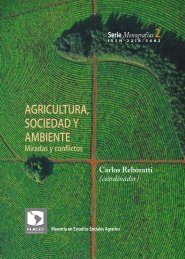
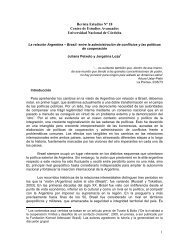
![[P] Disertacion.Melisa.Galvano.pdf - Flacso](https://img.yumpu.com/14596629/1/184x260/p-disertacionmelisagalvanopdf-flacso.jpg?quality=85)
